Israeli Prime Minister Benjamin Netanyahu insisted there was no "humanitarian catastrophe" in Rafah, even as hundreds of thousands fled the south Gaza city amid intense fighting.
Hamas meanwhile insisted it would take part in any decision on the post-war government of Gaza as Palestinians marked the 76th anniversary of the "Nakba", when around 760,000 Palestinians fled or were driven from their homes during the 1948 creation of Israel.
Israeli forces have bombed Hamas militants around Gaza's far-southern city of Rafah, but clashes have also flared again in northern and central areas which Israeli troops first entered months ago.
The upsurge in urban combat has fuelled US warnings that Israel, which launched its war after the 7 October Hamas attacks, risks being bogged down in years of counter insurgency.
However despite previous threats by US President Joe Biden to withhold some arms deliveries over Mr Netanyahu's insistence on attacking Rafah, his administration informed Congress on Tuesday of a new $1 billion (€918 million) weapons package for Israel, official sources told AFP.
The European Union urged Israel to end its military operation in Rafah "immediately", warning failure to do so would "inevitably put a heavy strain" on ties with the bloc.
However even as he announced that hundreds of thousands had been "evacuated", Mr Netanyahu insisted there was no humanitarian crisis in Rafah.
"Our responsible efforts are bearing fruit. So far, in Rafah, close to half a million people have been evacuated from the combat zones. The humanitarian catastrophe that was spoken about did not materialise, nor will it," he said.
The United Nations agency for Palestinian refugees, UNWRA, meanwhile said "600K people have fled Rafah since military operations intensified".
EU urges Israel to end offensive in Rafah 'immediately'
The European Union has urged Israel to end its military operation in Rafah in southern Gaza "immediately", warning that failure to do so would undermine ties with the bloc.
"Should Israel continue its military operation in Rafah, it would inevitably put a heavy strain on the EU's relationship with Israel," said the statement issued in the EU's name by its foreign policy chief Josep Borrell.
"The European Union urges Israel to end its military operation in Rafah immediately," the statement said, warning it was "further disrupting the distribution of humanitarian aid in Gaza and is leading to more internal displacement, exposure to famine and human suffering".
The bloc - the main aid donor for the Palestinian territories and Israel's biggest trading partner - said more than a million people in and around Rafah had been ordered by Israel to flee the area to other zones the UN says cannot be considered safe.
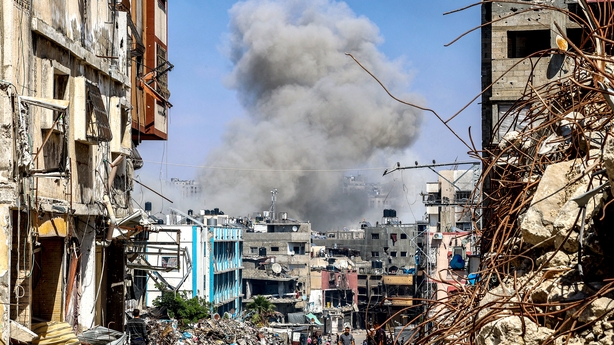
"While the EU recognises Israel's right to defend itself, Israel must do so in line with International Humanitarian Law and provide safety to civilians," it said.
The law requires Israel to allow in humanitarian aid, the statement stressed.
The EU also condemned a Hamas attack on the Kerem Shalom border crossing which blocked humanitarian relief supplies.
"We call on all parties to redouble their efforts to achieve an immediate ceasefire and the unconditional release of all hostages held by Hamas," it said.
Israel's main allies, the United States and the EU, as well as the United Nations, have all warned Israel against a major operation in Rafah given that it would add to the civilian toll.
It comes as gun battles between Israel and militants from Hamas, Islamic Jihad and smaller Palestinian factions intensified overnight into some of the fiercest in months in both northern and southern Gaza, both sides said.
Israeli tanks reached densely populated neighbourhoods and narrow alleyways of the militant stronghold of Jabalia in the northeast, facing heavy resistance.
Residents said the army destroyed clusters of homes there in areas where they had not invaded before.
We need your consent to load this rte-player contentWe use rte-player to manage extra content that can set cookies on your device and collect data about your activity. Please review their details and accept them to load the content.Manage Preferences
The armed wing of Hamas ally Islamic Jihad said its militants killed and wounded Israeli foot soldiers during fierce clashes in eastern Jabalia, the biggest of eight refugee camps built in Gaza after the 1948 Middle East Arab-Israeli war.
The Israeli military said it had begun an operation overnight against "terrorist operatives and infrastructure" in the centre of Jabalia.
"Over the past day, IDF troops in the area have engaged in intense battles with dozens of terrorist cells and eliminated a large number of terrorists," a statement said, including some it said had fired towards the Israeli city of Sderot yesterday.
Gaza's Civil Emergency Service and health ministry said rescue teams have been unable to reach areas where the army was operating to respond to calls for help.
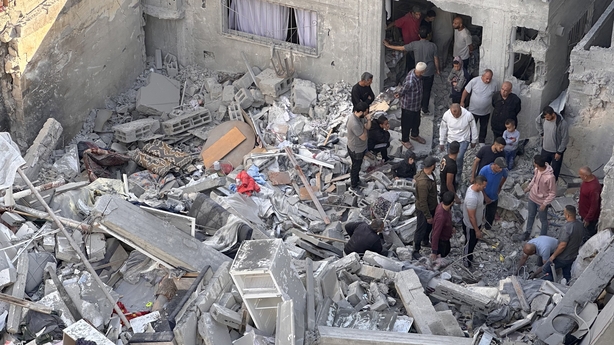
In Rafah - the city in southernmost Gaza where more than a million Palestinians are sheltering from fighting elsewhere, troops continued to operate in the eastern Al-Salam and Jeneina neighbourhoods and also in southeast, residents said.
They said troops and tanks were trying to move towards the centre of Rafah but were being met with heavy resistance from Hamas-led gunmen.
Israel said its troops began targeting a Hamas training compound in eastern Rafah, killing militants in close-quarters combat and finding large amounts of weapons and equipment intended to simulate that of the Israeli defence forces.
It said earlier that a soldier had been killed in combat in southern Gaza. A reporter for public broadcaster Kan said this was the first military fatality in Rafah since the start of the ground operation there last week.
Israel has ordered civilians to evacuate parts of Rafah, and UNRWA, the main United Nations aid agency in Gaza, estimates some 450,000 people have fled the city since 6 May. More than a million civilians had sought refuge there.
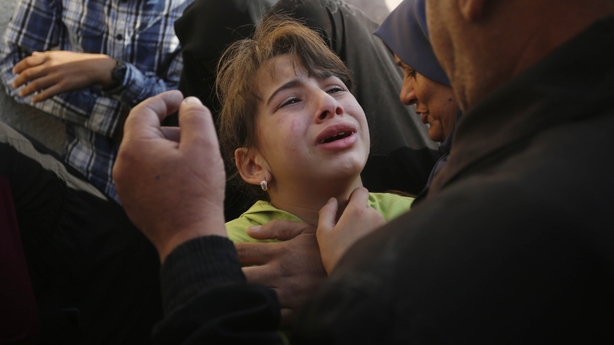
They are moving to places such as Al-Mawasi, a sandy coastal area that aid agencies say lacks sanitary and other facilities to host displaced people.
The UN agency for Palestinian refugees (UNRWA) said that families were being forcibly displaced again by Israeli forces' evacuation orders and enhancing military operations.
"Despite catastrophic humanitarian needs, access restrictions and lack of safe passage obstruct efforts of humanitarian organisations to reach people across the Gaza Strip," the agency said on X.
US pier for Gaza aid to be operational within days
A pier built by the US military for Gaza aid deliveries will be operational "in the coming days," the Pentagon said, after a week of bad weather delayed its installation.
With a cost of at least $320m (€295m) the pier is aimed at boosting humanitarian access to Gaza, which has been devastated by seven months of war between Israel and Hamas.
But poor sea conditions have made it unsafe to anchor the pier on the Gaza coast, and it was instead stowed at the port of Ashdod in Israel as construction was completed last week.
Asked when the pier would be installed, Pentagon spokesman Major General Pat Ryder told reporters "in the coming days, I think you can expect to see it operational," but declined to give a specific date.
Maj Gen Ryder added that there were US Navy destroyers in the region that could provide security assistance for the aid operation.
The Pentagon has previously said that Israeli soldiers will anchor the pier to the Gaza shore, keeping US troops off the ground.
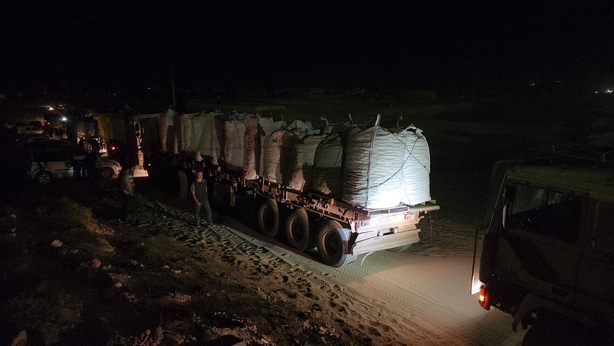
Plans for the pier were first announced by US President Joe Biden in early March as Israel held up deliveries of aid by ground, worsening the dire humanitarian situation in Gaza.
Under the plans, supplies will be transported out of Cyprus on commercial vessels to a floating platform also built by the US military off the Gaza coast.
Aid will then be transferred to smaller vessels and brought to the pier on the Gaza coast and taken to land by truck for distribution.
Maj Gen Ryder said the US and humanitarian groups were "pre-positioning aid in Cyprus to be loaded onto vessels for transport to the floating pier".
He said the US wanted to see aid delivered into Gaza at an "increased rate," adding it was working to open the Rafah border crossing between Israel and Egypt, which has been blocked since last week.
Mr Biden said last week he had delayed a shipment of bombs to Israel over concerns they might be used for a major invasion of Rafah.
Mr Biden has urged Israeli Prime Minister Benjamin Netanyahu not to invade Rafah without safeguards for civilians.
White House national security adviser Jake Sullivan told reporters on Monday that the US would continue to provide the military assistance provided in a $26bn supplemental funding bill passed last month, but the White House paused the bombs because "we do not believe they should be dropped in densely populated cities."
Mr Sullivan will visit Israel and Saudi Arabia this weekend. The Biden administration declined to comment on a report by Axios that Israel agreed not to expand its Rafah operation significantly before the visit.
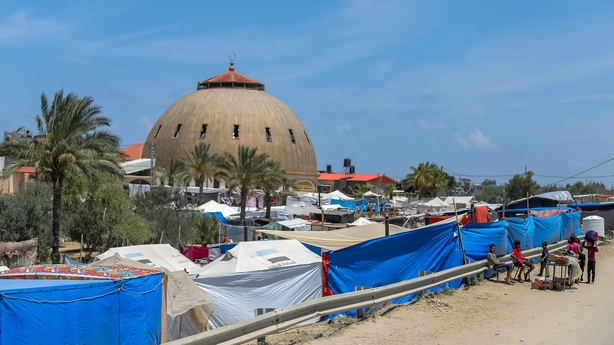
Meanwhile, Lebanese state media has reported that an Israeli strike on a car in the country's south killed two people, with a source close to Iran-backed Hezbollah saying a field commander was among the dead.
Israel and Hamas ally Hezbollah have exchanged near-daily fire following the Palestinian group's 7 October attack on southern Israel that sparked the war in Gaza.
At least 413 people have been killed in Lebanon in seven months of cross-border violence, mostly militants but also including 79 civilians, according to an AFP tally.
Israel says 14 soldiers and ten civilians have been killed on its side of the border.
Tens of thousands of people have been displaced on both sides.

